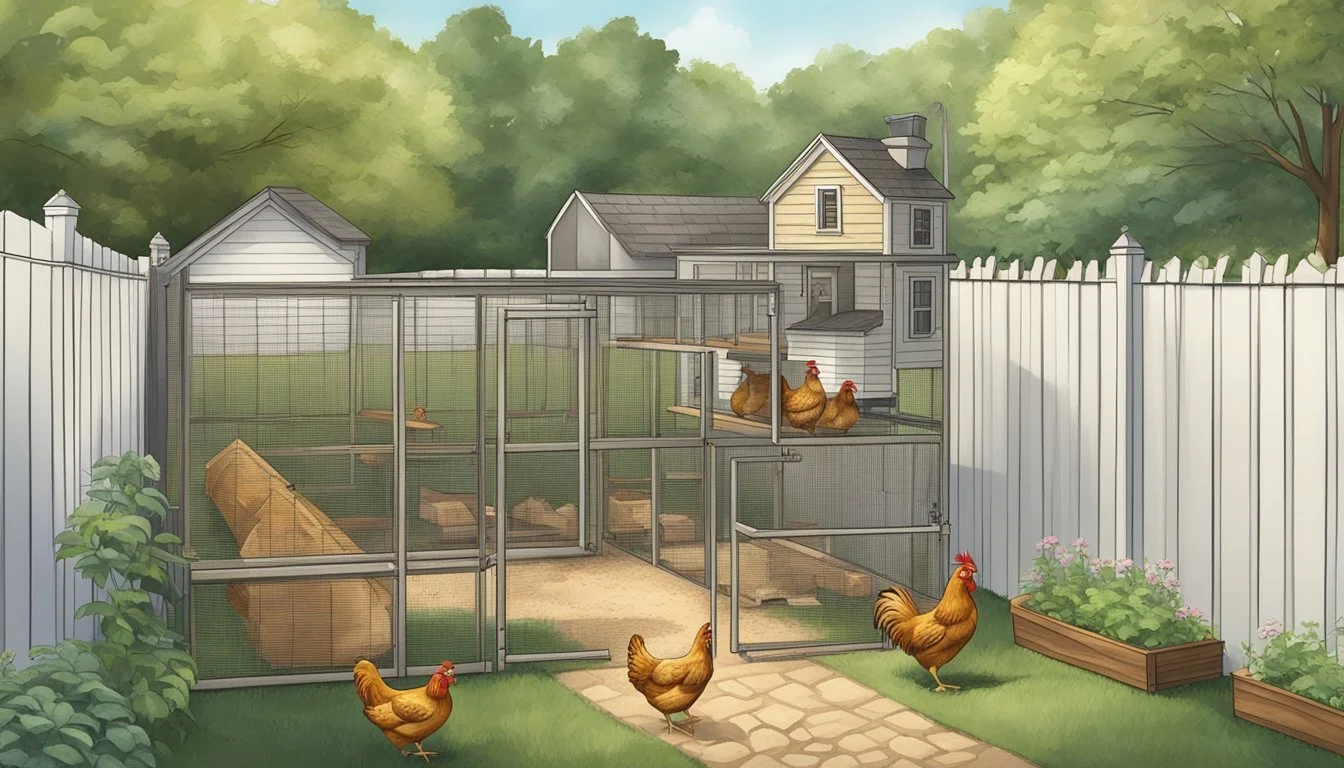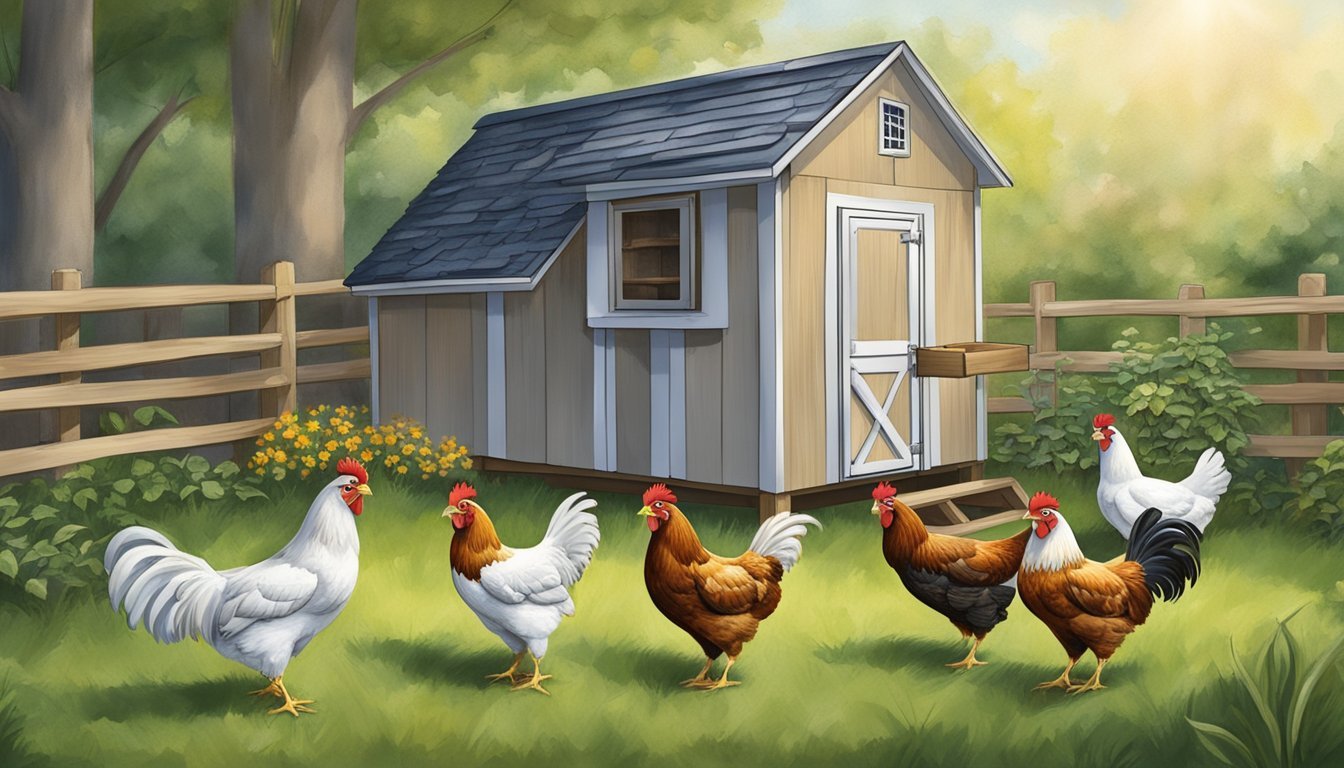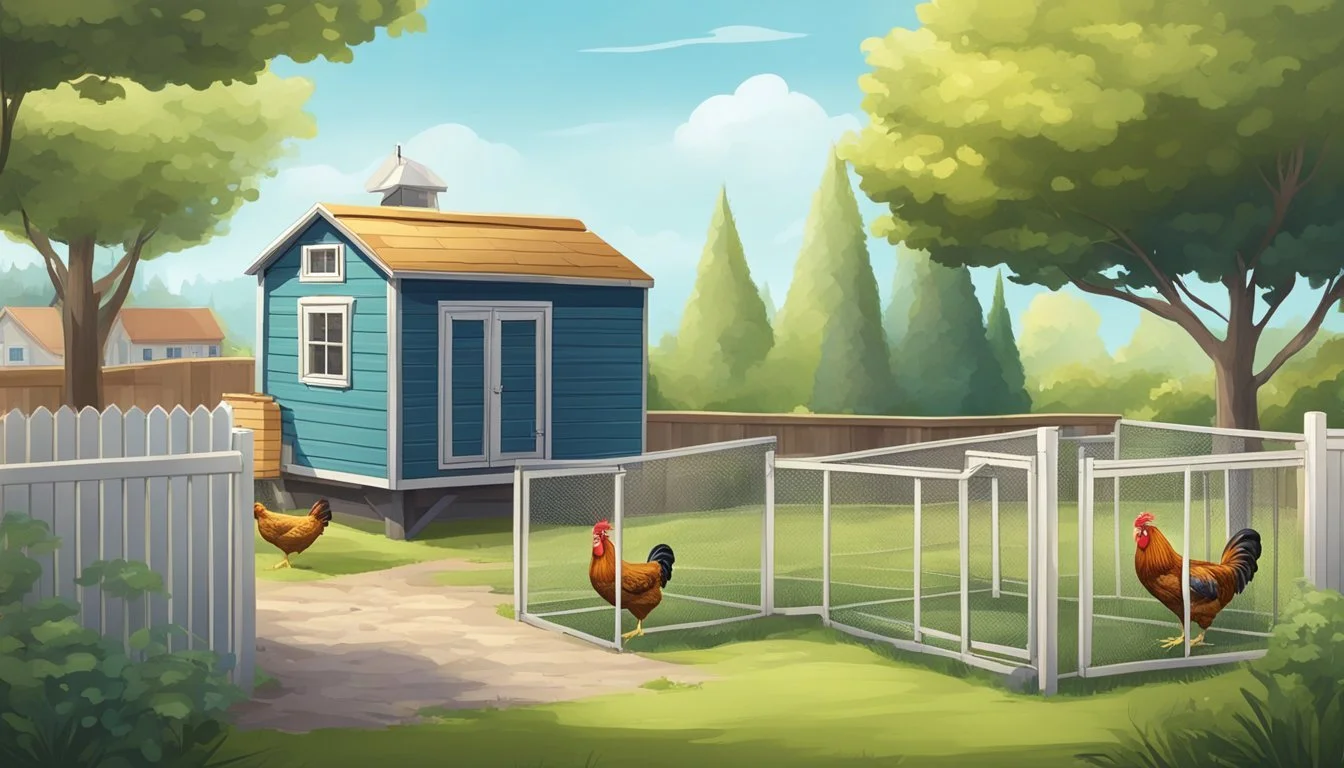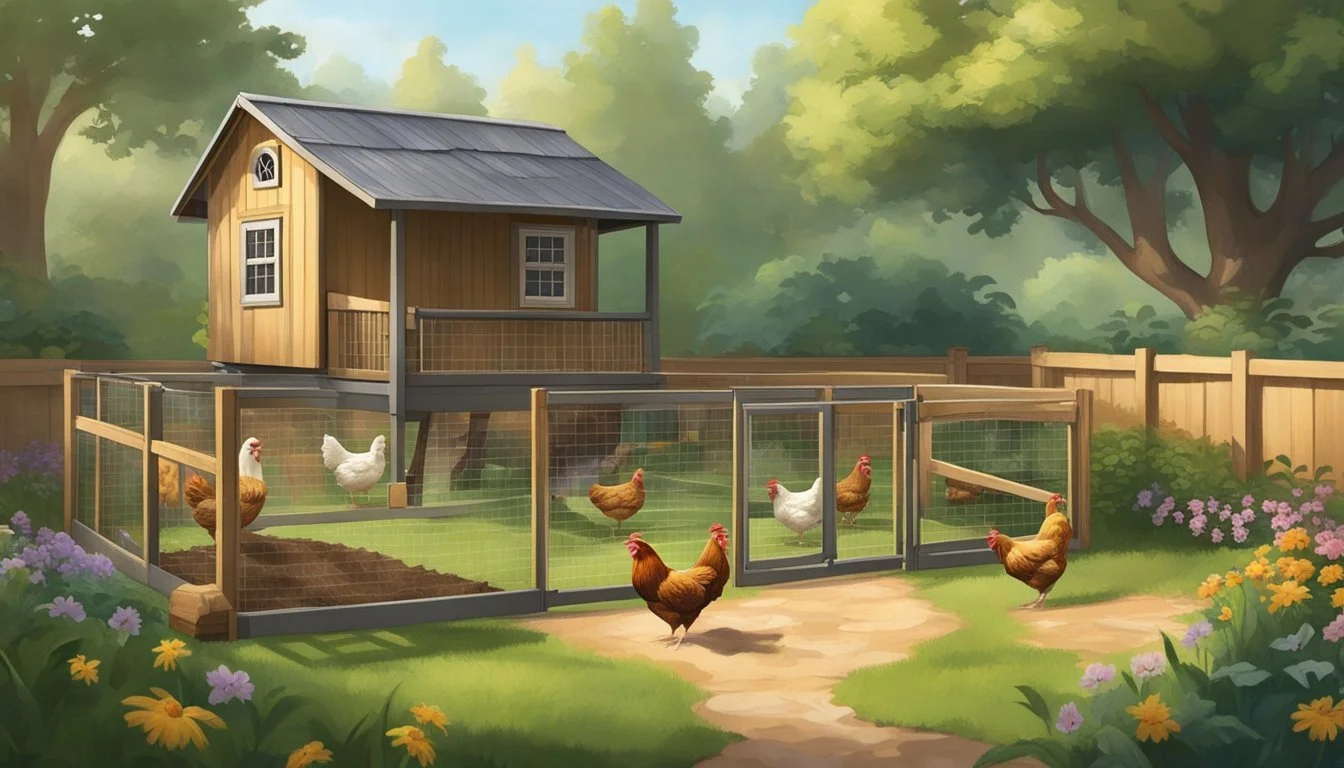Raising Backyard Chickens in Ellicott City, MD
A Starter Guide for Urban Poultry Farmers
Backyard chicken keeping has grown as an eco-friendly trend for urban and suburban residents looking to connect with sustainable living practices. In Ellicott City, Maryland, residents interested in joining this movement have specific guidelines to follow. The city allows the raising of up to eight hens, providing an opportunity for fresh eggs and the joys of poultry husbandry within a domestic setting. However, roosters are not permitted due to their potential for noise.
Local ordinances mandate that a lot must be a minimum of 10,000 square feet to qualify for keeping backyard chickens. These regulations ensure that chickens have adequate space, reducing the potential for nuisances and maintaining public health standards. The rules are a reflection of Ellicott City's commitment to balancing residential interests with community harmony.
Prospective chicken owners must also consider the placement of henhouses or chicken coops, which are subject to stipulations that prioritize both the welfare of the chickens and the concerns of neighbors. It is essential for residents to comply with all local laws pertaining to chicken raising and consult with the Bureau of Animal Control or relevant city department for detailed requirements and to obtain necessary permits.
Understanding Local Chicken Keeping Regulations
When raising backyard chickens in Ellicott City, MD, it is essential to know the specific regulations of the various counties, including lot size, hen and rooster allowances, and health requirements, ensuring adherence to local guidelines and maintaining good community relations.
Annapolis and Howard County Restrictions
In Howard County, where Ellicott City is located, regulations permit a maximum of eight hens, with roosters being completely prohibited. Residential lots must be at least 10,000 square feet to legally keep chickens. The Code of Ordinances must be consulted to ensure compliance with henhouse placement and other local requirements.
Baltimore City and County Policies
Baltimore County's policies stipulate that residents must manage chickens in such a way that they do not become a nuisance or health hazard. Specifics of lot sizes and the number of chickens allowed can vary and, thus, consultation with Baltimore County's local government advisories or council members is advised to obtain current and precise regulations.
Anne Arundel and Prince George's County Rules
In Anne Arundel County, residents are advised to check with the Maryland Department of Agriculture for health and sanitation guidelines. Prince George's County may have different requirements for waste management and permits, emphasizing the need for direct contact with local regulatory bodies to ensure rules are met.
Montgomery, Frederick and Surrounding Areas
Rules in Montgomery and Frederick counties, and their surrounding areas, are not uniform and can depend on the zoning designation of one's property. It is important for residents to acquire information directly from their Local Government to obtain a variance for property use if necessary or to understand the specific ordinances in place.
Planning Your Chicken Coop
Before embarking on the rewarding journey of raising backyard chickens, one must thoughtfully plan their chicken coop. It serves as the primary housing to keep chickens safe, healthy, and productive. Here, the essentials of coop planning are provided, focusing on design, space requirements, protection, and environmental health.
Coop Design Fundamentals
The coop's design is paramount, as it impacts the chickens' wellbeing and productivity. Ellicott City residents should ensure the coop offers ample ventilation while shielding chickens from harsh weather. The coop must include nesting boxes, with at least one box for every 3-4 hens, and sufficient roosting space with a minimum of 8 inches per bird. An accessible door for egg collection and cleanup operations is also essential.
Space and Setback Requirements
In Ellicott City, MD, important regulations must be followed concerning coop space and placement. Each chicken should have about 2-3 square feet of indoor coop space and 8-10 square feet in an outdoor run. Setbacks, which are the minimum distances from property lines or dwellings, vary and must be verified with local zoning laws. For instance, coops typically must be placed at least 25 feet from the owner's dwelling and farther from neighboring homes.
Predator-Proofing Strategies
Protection from predators is non-negotiable for a chicken coop. The coop should be built with sturdy materials to withstand intrusion, with all gaps sealed. Hardware cloth is recommended over chicken wire, as it is more durable against raccoons and foxes. The coop should include a buried perimeter of the same material to deter digging predators, and locks should be used on doors and windows to secure the housing further.
Maintaining a Clean and Healthy Environment
A clean coop is vital for the health of your chickens and the overall environment. The design should facilitate easy cleaning, with removable trays for waste and nest boxes that can be easily accessed for maintenance. Proper drainage around the coop will ensure that standing water does not become a problem, maintaining a dry and clean area for the chickens to roam. Regular cleaning and disinfecting will prevent the outbreak of diseases and keep the coop free of odors and pests.
Chicken Care and Management
Raising backyard chickens in Ellicott City requires attentive care and management to ensure the birds' health and compliance with local laws. It is important for owners to stay informed on the latest standards for feeding, disease prevention, and daily care.
Feeding and Nutrition
Chickens require a balanced diet to maintain health and productivity. Owners should provide:
0-8 weeks: Starter feed with 18-20% protein.
8-14 weeks: Starter/grower feed with 16-18% protein.
15-18 weeks: Finisher feed with 16% protein.
Layer chickens, specifically hens, benefit from layer feed with increased calcium to support eggshell strength. It is advisable to offer organic diet options to avoid unwanted chemicals and to ensure a natural growth process.
Disease Prevention and Health Monitoring
Chickens must live in a clean environment to prevent the spread of disease. Health monitoring includes:
Regular Check-ups: Schedule veterinary visits to catch and treat illnesses early.
Clean Shelter: Proper litter management within their shelter is essential to prevent odors and discourage disease vectors.
Biosecurity Measures: Implementing measures to reduce the risk of disease transmission, such as restricting bird exposure to wild birds and practicing good hygiene.
Vaccinations and treatments for parasites are also important parts of health maintenance. Early disease detection and swift action can save an entire flock from illness.
Daily and Seasonal Care Routines
Daily and seasonal routines are critical to chicken care:
Daily: Inspect chickens for signs of distress or illness. Clean waterers and feeders to prevent mold and disease.
Seasonal: Adjust shelters for weather changes, ensuring proper insulation during winter and ventilation during summer.
Careful attention to lighting is important, as hens require specific light conditions for optimal egg-laying. Regularly scheduled care routines help maintain a stress-free environment for both roosters and hens, leading to a healthy flock.
Community Engagement and Education
In Ellicott City, MD, raising backyard chickens is not just a trend, but a community-driven initiative bolstered by varied platforms for learning and connection.
Using Social Media for Chicken Keeping Knowledge
Social media platforms, particularly Facebook and Pinterest, provide residents with an abundant stream of knowledge on poultry care. The Chickens in Howard County Facebook page, is a pivotal online meeting ground where members exchange tips, share experiences, and disseminate updates on local legislation affecting chicken enthusiasts.
Local Workshops and Farm Store Resources
Farm stores in and around Ellicott City have become integral in offering both supplies and expertise for those looking to raise chickens. They frequently host workshops, providing hands-on education for proper chicken care. These local businesses keep the community informed through Patch newsletters and alerts, ensuring residents have the latest information on best practices in backyard poultry keeping.
Connecting with County Residents and Chicken Enthusiasts
To foster a sense of community among poultry aficionados, Ellicott City promotes engagement through various channels. They facilitate discussions between seasoned experts and novices, creating a robust support network for individuals endeavoring to raise chickens. By being proactive, county residents can stay abreast of zoning legislation updates and participate in shaping the policies that affect their backyard chicken keeping activities.
Legal Considerations and Compliance
When raising backyard chickens in Ellicott City, MD, residents must adhere to specific requirements set by local authorities. Compliance involves understanding zoning laws, slaughtering restrictions, and the necessary licenses.
Navigating Zoning Laws
In Ellicott City, and throughout Maryland, zoning regulations determine where chickens can be raised. Individuals should consult the Ellicott City Planning Board or city officials to obtain the most current rules. Common zoning laws typically stipulate:
Lot size: Minimum requirements for the property size.
Distance: Regulations on how far the chicken coop must be from neighbors’ homes.
Quantity: Limits on the number of chickens a resident can keep.
Understanding Slaughtering Restrictions
Slaughtering chickens is subject to local ordinances. Ellicott City generally prohibits the slaughter of chickens in residential areas. Those looking to process chickens for meat must do so at:
Licensed and inspected facilities.
Locations that adhere to humane and health standards.
Acquiring Necessary Licenses
A license or permit might be required to legally raise backyard chickens. Residents should reach out to Ellicott City's Licensing Department to confirm if a license is necessary. Keep in mind:
License applications usually need a fee and site plan for the coop.
Neighbors might be notified for feedback on the licensing request.
Residents must stay up-to-date with any changes in rules to ensure ongoing compliance.
Conclusion
Raising backyard chickens in Ellicott City, MD is subject to specific local regulations that prospective chicken keepers must adhere to. It is imperative that residents contact Ellicott City officials or the Bureau of Animal Control at 410-396-4698 to obtain the most current information and necessary permits.
Individuals are encouraged to consider the following key points when deciding to keep chickens:
Zoning regulations vary and they determine if and how residents can keep chickens.
Lot size impacts the number of chickens allowed; smaller lots tend to have a cap on the number allowed.
Coops must maintain a minimum distance from any dwelling, commonly at least 15 feet.
Additional rules may govern the maintenance and welfare of the chickens to ensure they do not become a nuisance or a health hazard.
By complying with local laws and ordinances, residents of Ellicott City can enjoy the benefits of fresh eggs and the pleasures of chicken keeping. They must, however, remain vigilant about the well-being of their flocks and neighbors’ considerations.
For more detailed guidance and up-to-date rules, residents should review the latest guidelines provided by Maryland Chicken Laws and resources such as the Maryland People's Law Library. Through informed and responsible practices, chicken enthusiasts will contribute positively to the community and local ecosystem.








